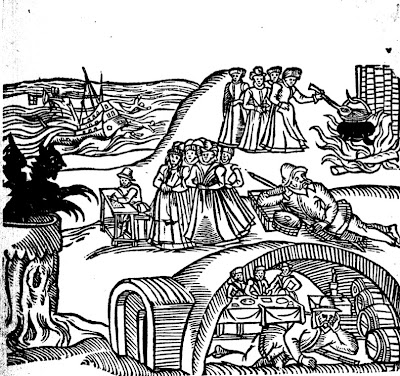From John Taylor's Jack A Lent (1620)
The tradition of Shrove Tuesday, and in particular its association with pancakes, was well-established by the seventeenth century. Occurring on the day before Lent, Shrove Tuesday afforded the last opportunity to gorge on foods which were forbidden during the Lent fast. Below is an account of what we now call Pancake Day from John Taylor's Jack A Lent (1620). This is followed by a couple of seventeenth century recipes.
Alwayes before Lent there comes waddling a fat grosse bursten-gutted groom called Shrove-Tuesday, one whose manners shewe that hee is better fed than taught. And indeed hee is the only monster for feeding amongst all the days of the year, for hee devours more flesh in fourteen hours, than this whole Kingdom doth in six weeks after.
On the morning of Shrove Tuesday the whole kingdom is in quiet, but by the time the clock strikes eleven, there is a Bell rung, call'd The Pancake Bell, the sound whereof makes thousands of people distracted, and forgetful either of manners or humanities. Then there is a thing cal'd wheaten flower, which the Cookes doe mingle with water, Egges, Spice, and other tragical magical enchantments, and then they put it by little and little into a Frying pan of boiling Suet, where it make a dismal hissing, until at the last by the skill of the Cookes, it is transformed into the forme of a flap-jack, which in our translation is call'd a Pancake which the ignorant people doe devour very greedily.
Thomas Dekker, in his play The Shoemakers Holiday (1600), references the holiday spirit of Shrove Tuesday:
when the pancake bell rings, we are as free as my lord Mayor, we may shut up our shops, and make holiday.
And even Shakespeare refers to pancakes:
Clown
As fit as ten groats is for the hand of an Atturney, as your French Crowne for your taffety punke, as Tibs rush for Toms fore-finger, as a pancake for Shrove-tuesday, a Morris for May-day, as the naile to his hole, the Cuckold to his horne, as a scolding queane to a wrangling knave, as the Nuns lip to the Friers mouth, nay as the pudding to his skin.
(All's Well That Ends Well, 2.2.20-26)
Here are two recipes for making authentic seventeenth century pancakes, the first from The Art of Cookery (1654), and the second from the 1623 edition of Gervaise Markham's Countrey Contentments.
How to make Pancakes
Take twenty Eggs, with halfe the whites, and beat them half an houre or more with fine flour of Wheat, Cloves, Mace, and a little Salt, Creame, a little new Ale, or a spoonfull of Yest being warmed, and beat them well together; make it so thin as to run out of your spoon or ladle without any stop: this being done, cover it and set by the fire halfe an houre, or more, stirring it now and then; fry them with a quick fire (but not too hot) with a little Butter; and after you have fryed one or two, you may fry them without Butter as well as with it, and will be better, if you love them dry; scrape Sugar on them and serve them up.
To make the best Pancake, take two or three Egges, and breake them into a dish, and beate them well: then adde unto them a pretty quantitie of faire running water, and beate all well together: then put in Cloves, Mace, Cinamon, and a Nutmeg, and season it with Salt: which done, make it thick as you thinke good with fine Wheat flower: then frie the cakes as thin as may be with sweete Butter, or sweete Seame, and make them browne, and so serve them up with Sugar strowed upon them. There be some which mixe Pancakes with new Milke or Creame, but that makes them tough, cloying, and not so crispe, pleasant and savorie as running water.








